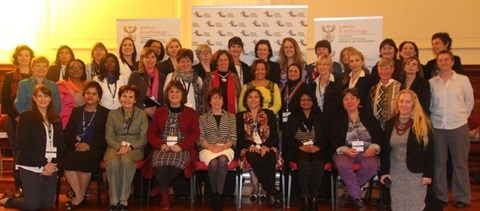In 2014, South Africa's Science and Technology Minister Naledi Pandor issued a call for 20 new researchers to join the prestigious ranks of the South African Research Chairs Initiative (SARChI). The twist? All of the positions would be filled by women...
There was concern that these positions would not be filled. Where would the country's universities find 20 eligible women researchers, given that only one in five SARChIs had been awarded to women in the last decade?
These concerns proved to be unfounded. Universities put forward so many top tier women, who are local and international leaders in their fields, that ultimately 42 positions were green lighted by the minister herself.
Unveiling the SARChI 42, Pandor said:
What impressed the (National Research Foundation) selection committee the most about the SARChI 42 was their calibre. SARChI is not a development programme and the SARChI 42 are not quota appointments. The SARChI 42 give women an opportunity to which men have, for far too long, felt entitled. The SARChI 42 takes the systemic bias and gender gate-keeping out of the programme.
I was honoured to be among the SARChI 42 and delighted to hear the minister's fighting words in person. We can reach equality without compromising on quality. But two questions arise in the wake of the celebrations.First, all of the new chairs were already working within university structures - so why weren't institutions proposing these excellent women as research chairs in the first place?
Second, how can policies at universities and in research institutions be changed to boost the space for gender equity within the sciences?

SARChI 42
Gender equity matters
One may be tempted to ask, why should we bother? Is there really a strong case to be made to ensuring there is gender equity within the sciences? Why do we really need more women in science? National Geographic recently offered some powerful answers to these questions.
It is clear that we need more women in research and innovation to advance these fields.
More women in science can bring real change. We can produce medications that minimise the side effects for women, not just for men. With more women in laboratories and research units, we may catch more heart attacks, drive safer cars, enjoy more convenient transport systems, understand the effects of a researcher's sex on their research, develop self cleaning houses, cure tuberculosis and understand the nature of our universe and everything in it.
As a P-rated scientist and South Africa's first female SARChI in the Mathematical or Physical Sciences, expectations of my scientific future are high. And as a mother with two young children and particularly high standards of parenting, I have ruminated on the demands of science and parenting for some time now.
I would love to share my personal experiences and views as well as the opinions and experiences of the women I know in science. But there's no amount of anecdotal evidence that can replace scientific studies - so let's explore what such studies have found.
Investment yields results
The dramatic dearth of women in science, technology, engineering and maths, is felt most acutely at senior levels. This has a deleterious, knock on effect on all career stages because of a lack of mentoring and role modelling, as well as engagement in policy.
Globally, effective policy changes have been shown to dramatically improve gender equity.
These initiatives include simple, low cost options like holding all core business meetings within school hours; offering space for breastfeeding mothers to express and safely store their milk; and ensuring gender representation at conferences, workshops and on important committees. Universities and research units should set up gender equity committees to develop and implement such policies.
There are other, more expensive but effective interventions. These include covering childcare costs for women with babies and pre-school aged children; introducing flexible fellowships for senior women to become group leaders and providing a family room at conferences so that researchers can sit and listen to talks while accompanied by their children.
Perhaps most crucially, universities that are serious about gender equity should pay for female scientists to take their children and a carer along to academic conferences.
Attending and presenting at such meetings is crucial for scientific progress, the exchange of ideas, building new collaborations and networks and disseminating results.
This is all money well spent: global studies conducted by the likes of Goldman Sachs and Columbia University have found that companies or organisations that employ women in large numbers outperform their competitors on every measure of profitability.
These paths may feel new and scary, but they have been well walked by universities and research institutes abroad. Our academic colleagues in the UK, the US and Australia are making significant, positive changes.
Time for action
There is phenomenal scientific and leadership potential among South Africa's female population. But investment is needed to reach a future where women take their rightful place on the scientific and innovation stage. Policy changes, as successful international examples show, are not optional - they are critical.
It is long past time for institutional and national change. South Africa's universities and research institutions must lead from the front and take Pandor's fighting words forward from ideas to action. Isn't it time we join the future?



































